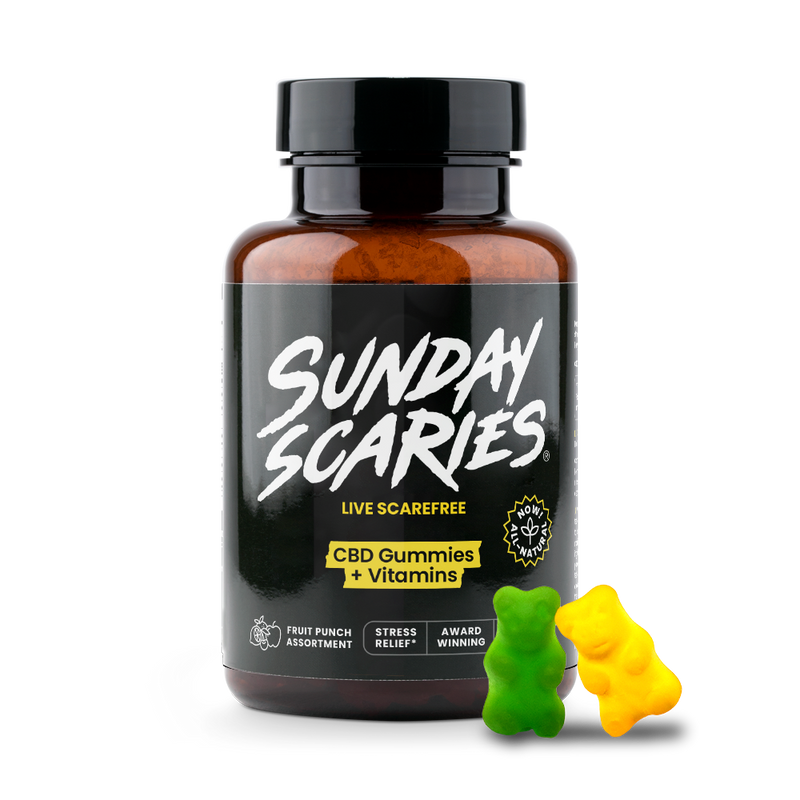
What is CBC? An In-Depth Exploration
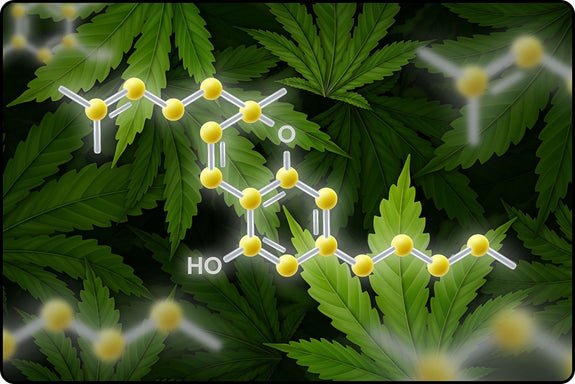
Cannabichromene (CBC) is a non-psychoactive cannabinoid found in the cannabis plant, known for its potential anti-inflammatory, analgesic, antimicrobial, and neuroprotective properties. It is also called "The Silent Giant" due to its gigantic benefits, while being less well known than other cannabinoids like THC and CBD.
Cannabis is a complex plant known for its numerous compounds, each contributing uniquely to its effects and benefits.
While most people are familiar with THC (tetrahydrocannabinol) and CBD (cannabidiol), another significant cannabinoid that has been gaining attention is CBC, or cannabichromene.
This comprehensive blog article delves into the intricacies of CBC, exploring its origins, properties, benefits, and potential applications.
Introduction to CBC
Cannabichromene (CBC) is one of the more than 120 cannabinoids found in the cannabis plant.
Discovered over 50 years ago, CBC is non-psychoactive, meaning it does not produce the "high" associated with THC.
Despite being less well-known than THC and CBD, CBC plays a crucial role in the overall therapeutic effects of cannabis, often working synergistically with other cannabinoids in a theory known as the "entourage effect."
The Origin of CBC
CBC originates from the same precursor as THC and CBD—cannabigerolic acid (CBGA). Through a series of enzymatic reactions, CBGA converts into cannabichromenic acid (CBCA), which, when exposed to heat or ultraviolet light, decarboxylates into CBC.
This process highlights the intricate biochemistry of the cannabis plant and the interconnectedness of its various compounds.
The Chemical Structure of CBC
CBC's chemical structure is similar to other cannabinoids, comprising a pentyl side chain.
This structure allows it to interact with the endocannabinoid system (ECS), albeit in a unique manner compared to THC and CBD.
CBC's interactions with the ECS are still under investigation, but it is known to bind with several receptors, including TRPV1 and TRPA1, which are associated with pain perception and inflammation.
How CBC Works: Interaction with the Endocannabinoid System
The endocannabinoid system (ECS) is a complex cell-signaling system involved in regulating various physiological processes, including pain, mood, appetite, and immune response.
While THC primarily binds to CB1 receptors in the brain and CBD has a more indirect interaction with the ECS, CBC operates differently.
Interaction with Receptors
CBC is believed to interact with several receptors in the ECS, notably TRPV1 (transient receptor potential vanilloid 1) and TRPA1 (transient receptor potential ankyrin 1).
These receptors are involved in modulating pain and inflammation. By interacting with these receptors, CBC can influence the body's response to pain and inflammatory processes.
The Entourage Effect
One of the fascinating aspects of CBC is its potential role in the entourage effect. This phenomenon occurs when multiple cannabis compounds work together to enhance the overall therapeutic effect.
CBC, in conjunction with other cannabinoids like THC and CBD, may contribute to a more comprehensive and effective treatment for various conditions.
Therapeutic Benefits of CBC
Emerging research suggests that CBC offers a range of therapeutic benefits, making it a promising compound for medical use. Here are some of the potential benefits:
1. Anti-Inflammatory Properties
Inflammation is a common underlying factor in many chronic diseases, including arthritis, inflammatory bowel disease, and neurodegenerative conditions.
Studies are currently underway to determine if CBC has significant anti-inflammatory properties, potentially making it a valuable treatment for the setbacks that get triggered by these conditions.
By interacting with TRPV1 and TRPA1 receptors, CBC can help reduce swelling and alleviate body aches.
2. Pain Relief
CBC's interaction with pain-modulating receptors like TRPV1 and TRPA1 suggests it could be an effective analgesic.
Research indicates that CBC may help reduce pain by desensitizing these receptors, offering relief without the psychoactive effects associated with THC. Although, more studies need to be performed to back these claims.
3. Antimicrobial and Antifungal Effects
Cannabichromene has demonstrated antimicrobial and antifungal properties, making it a potential candidate for treating infections.
Studies are being conducted to decipher whether CBC can inhibit the growth of various bacteria and fungi, suggesting its use in managing bacterial and fungal infections.
4. Neuroprotective Properties
Neurodegenerative diseases, such as Alzheimer's and Parkinson's, are characterized by the progressive loss of neuron function.
Preliminary research has commenced to determine whether CBC may have neuroprotective properties, with hopes that it can help preserve neuron function and potentially slow the progression of these diseases.
5. Mood Regulation
CBC's interaction with the endocannabinoid system may also influence mood regulation.
Although research is still in its early stages, there may be potential for CBC to be used in managing mood disorders such as depression and anxiety.
Its non-psychoactive nature makes it an attractive option for individuals seeking relief without the mind-altering effects of THC.
Potential Applications of CBC
Given its therapeutic potential, CBC could be used in various medical and wellness applications. Here are some potential uses:
1. Muscle or Joint Ache Relief
Chronic pain affects millions of people worldwide and can significantly impact quality of life.
CBC's potential pain-relieving and anti-inflammatory properties make it the perfect study candidate for managing chronic pain conditions, such as arthritis and fibromyalgia.
Its non-psychoactive nature also makes it suitable for long-term use.
2. Skin Health
CBC's antimicrobial and anti-inflammatory properties suggest it could be beneficial for skin health.
Topical formulations containing CBC may help manage conditions like acne, eczema, and psoriasis by reducing inflammation and inhibiting microbial growth.
3. Neurodegenerative Diseases
As research progresses, CBC may become an important component in the treatment of neurodegenerative diseases. The hope is that the neuroprotective properties could help preserve cognitive function and slow the progression of diseases like Alzheimer's and Parkinson's, although more studies need to be conducted in order to make these claims.
4. Mental Health
CBC's potential to regulate mood and alleviate symptoms of stress and feeling "down and out" opens the door for its use in mental health treatments.
As a non-psychoactive compound, it offers a promising alternative to traditional psychiatric medications, which often come with a range of side effects.
This is one of the main reasons we use a full-spectrum CBD blend in all of our products here at Sunday Scaries except for our CBD dog treats which are made using CBD isolate.
Full-spectrum oil contains all of the cannabinoids in their most natural form in order to optimize for efficacy. CBC is included in this proprietary blend, and can be found in the following Sunday Scaries CBD edible products:
CBC vs. Other Cannabinoids
While CBC shares some properties with other cannabinoids, it also has unique characteristics that set it apart.
CBC vs. CBD
Both CBC and CBD are non-psychoactive and offer anti-inflammatory, analgesic, and neuroprotective benefits. However, their mechanisms of action differ. CBD primarily interacts with CB1 and CB2 receptors, while CBC targets TRPV1 and TRPA1 receptors.
This difference in interaction pathways suggests that CBC and CBD may complement each other when used together, potentially enhancing their overall therapeutic effects.
- For a more in depth explanation, check out our resource: What is CBD?
CBC vs. THC
The primary distinction between CBC and THC is their psychoactive properties. THC produces the "high" associated with cannabis, while CBC does not. This makes CBC a more attractive option for individuals seeking therapeutic benefits without the psychoactive effects.
Additionally, CBC's anti-inflammatory and analgesic properties may complement THC's effects, potentially reducing the required dosage of THC for pain relief.
The Future of CBC Research
The potential of CBC is vast, but much of its promise remains untapped due to limited research. As interest in cannabis and its compounds grows, more studies are being conducted to explore CBC's therapeutic potential. Future research will likely focus on:
Clinical Trials
Conducting clinical trials to evaluate CBC's effectiveness and safety in treating various conditions is crucial. These trials will provide valuable data on dosages, side effects, and long-term effects, helping to establish CBC as a viable treatment option.
Synergistic Effects
Exploring the synergistic effects of CBC with other cannabinoids and compounds is another important area of research. Understanding how CBC interacts with other substances will help optimize its use in therapeutic applications.
Mechanisms of Action
Further investigation into CBC's mechanisms of action will provide deeper insights into how it interacts with the endocannabinoid system and other receptors. This knowledge will help tailor treatments to specific conditions and improve overall efficacy.
Conclusion
Cannabichromene (CBC) is an intriguing cannabinoid with significant therapeutic potential. Its potential anti-inflammatory, analgesic, antimicrobial, neuroprotective, and mood-regulating properties make it a promising candidate for various medical applications.
As research continues to unfold, this "Silent Giant" cannabinoid may emerge as a key player in the world of cannabinoids, offering new hope for those seeking natural and effective treatments for a range of conditions.
While much is still to be discovered, the future of CBC research looks promising. As more studies are conducted and our understanding of this cannabinoid deepens, we can expect to see CBC playing a more prominent role in medical and wellness circles, potentially transforming the way we approach health and healing.
Frequently Asked Questions
Is there CBC in THC gummies?
Yes, there is CBC in THC Gummies, including Delta-9 Gummies. CBC is one of the many cannabinoids found in cannabis, and it often appears in full-spectrum cannabis extracts used to make these edibles, contributing to the entourage effect for enhanced therapeutic benefits.

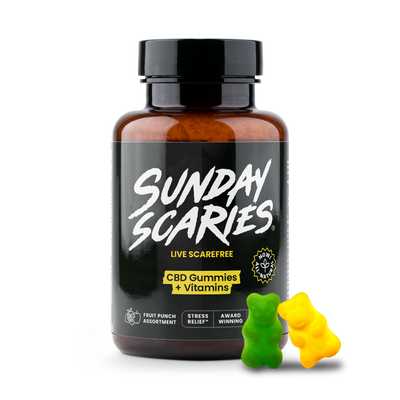 CBD Gummies
Stress Relief
CBD Gummies
Stress Relief
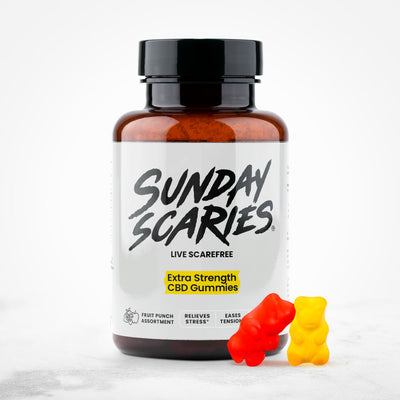 Extra Strength CBD Gummies
Stress Relief
Extra Strength CBD Gummies
Stress Relief
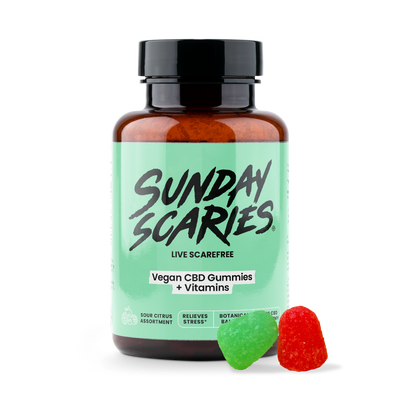 Vegan CBD Gummies
Stress Relief
Vegan CBD Gummies
Stress Relief
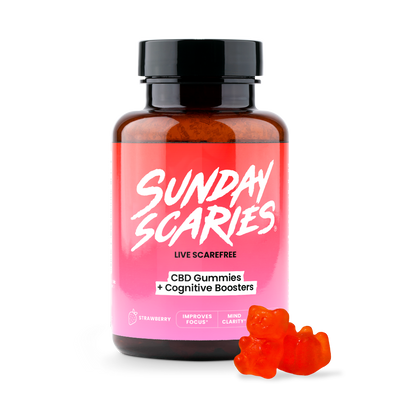 CBD Gummies for Focus
Focus Boost
CBD Gummies for Focus
Focus Boost
 CBD Candy
Mood Lift
CBD Candy
Mood Lift
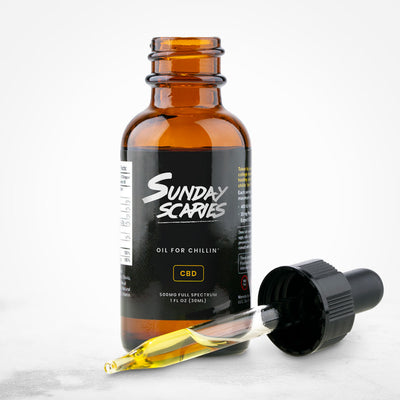 CBD Daytime Oil
Stress Relief
CBD Daytime Oil
Stress Relief
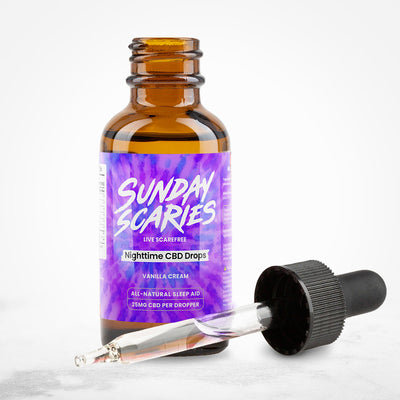 CBD Sleep Oil
Sleep Aid
CBD Sleep Oil
Sleep Aid
 CBD Dog Treats
Stress Relief
CBD Dog Treats
Stress Relief
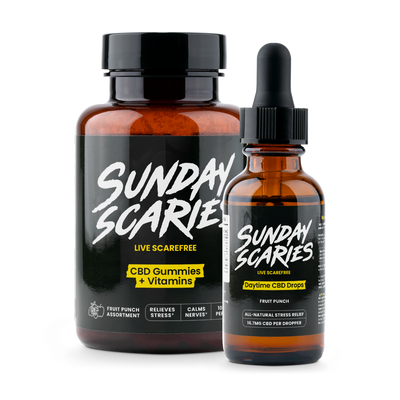 Side Piece Bundle
Stress Relief
Side Piece Bundle
Stress Relief
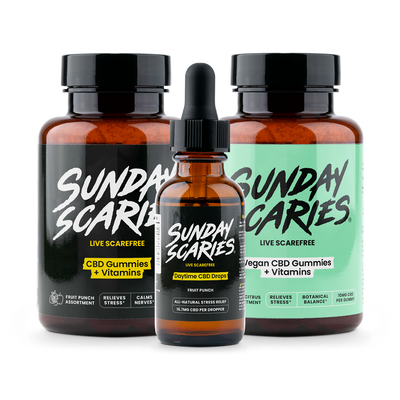 Rando Bundle
Stress Relief
Rando Bundle
Stress Relief
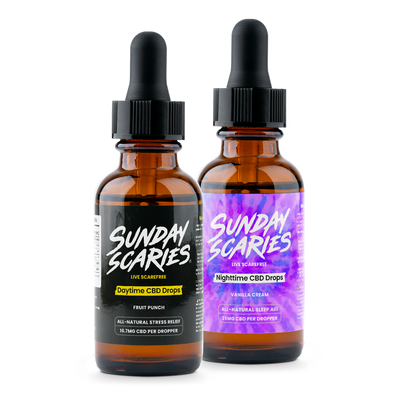 Sunrise & Sunset CBD Oil Bundle
Stress Relief
Sunrise & Sunset CBD Oil Bundle
Stress Relief
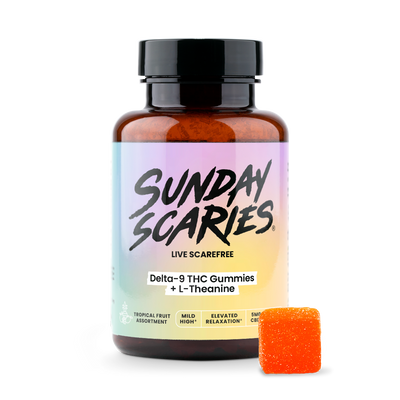 5mg Delta-9 Gummies
Euphoria
5mg Delta-9 Gummies
Euphoria
 10mg Delta-9 Gummies
Euphoria
10mg Delta-9 Gummies
Euphoria
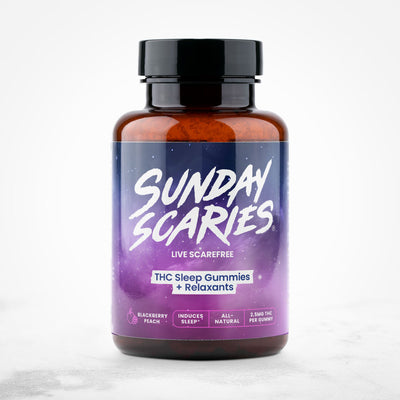 THC Gummies for Sleep
Sleep Aid
THC Gummies for Sleep
Sleep Aid
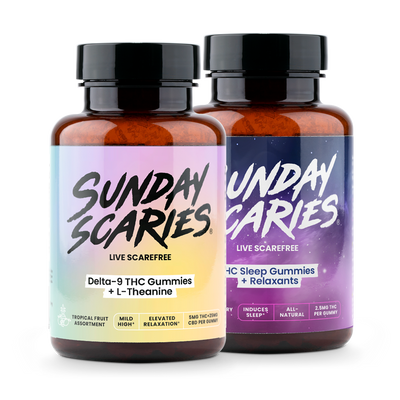 Day & Night THC Gummies Bundle
Stress Relief
Day & Night THC Gummies Bundle
Stress Relief
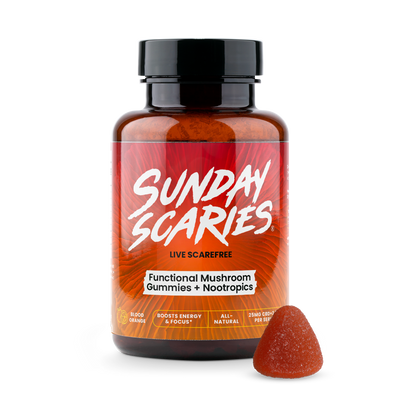 Mushroom Gummies
Focus Boost
Mushroom Gummies
Focus Boost
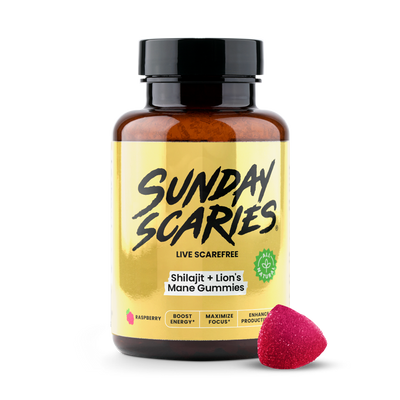 Shilajit Gummies
Focus Boost
Shilajit Gummies
Focus Boost
 Sunday Scaries Hat
Sunday Scaries Hat
 Sunday Scaries Dad Hat
Sunday Scaries Dad Hat
 Sunday Scaries T-Shirt
Sunday Scaries T-Shirt
 Sunday Scaries Pocket Tee
Sunday Scaries Pocket Tee
 Sunday Scaries Tank Top
Sunday Scaries Tank Top
 Sunday Scaries Sweatshirt
Sunday Scaries Sweatshirt
 Sunday Scaries Blanket Jacket
Sunday Scaries Blanket Jacket
 Sunday Scaries Sweatpants
Sunday Scaries Sweatpants

